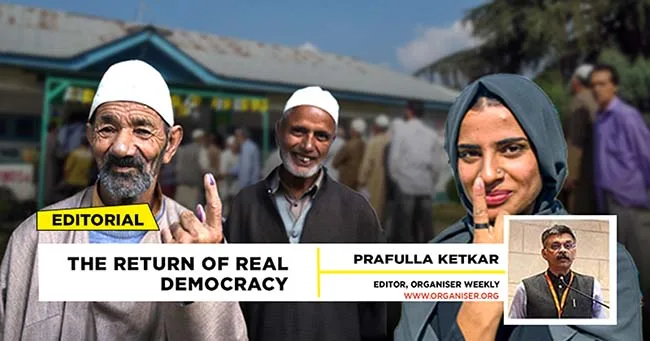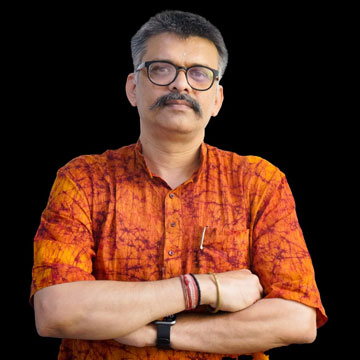“The Constitution of India is a complete code for constitutional governance. Following the application of the Constitution of India in its entirety to the State of Jammu and Kashmir by CO 273, the Constitution of the State of Jammu and Kashmir is inoperative and is declared to have become redundant; the views of the Legislature of the State under the first proviso to Article 3 are recommendatory. Thus, Parliament’s exercise of power under the first proviso to Article 3 under the Proclamation was valid and not mala fide.” – SUPREME COURT OF INDIA while delivering the judgement on the ORIGINAL WRIT / APPELLATE JURISDICTION Writ Petition (Civil) No. 1099 of 2019 IN RE: ARTICLE 370 OF THE CONSTITUTION December 11, 2023, p. 320-321
After the historic amendment to Article 370 and abrogation of Article 35A, elections to the Union Territory of Jammu-Kashmir are taking place in an unprecedented atmosphere of enthusiasm and peace. The Abdullah-Gandhi dynasties, the root cause behind keeping the people of Jammu-Kashmir away from the benefits of the Constitution, are back in the alliance. National Conference is harping on ‘restore 370’ agenda’ while Congress is meekly supporting it. Some agenda-driven media houses are trying to turn this election into a sort of referendum on the August 5, 2019 decision of the Parliament. Once the Supreme Court rejected the petitions related to Article 370, considering the decision to amend the same and extend the entire Constitution to Jammu-Kashmir, the election cannot be about Article 370. As the Court clearly stated, “Article 370 was a feature of asymmetric federalism and not sovereignty”, and “The State of Jammu and Kashmir, by ratifying the Constitution, accepted the model of constitutional governance envisaged by the Indian Constitution. Accession to India could not be merely a matter of territorial integration to India without constitutional integration”. Amendment to Article 370 was the completion of the Constitutional integration process. This election is about restoring and sustaining the true spirit of democracy. There are multiple reasons to believe that after decades, Jammu-Kashmir is getting the taste of real democracy.
For the 90 newly carved out constituencies after the delimitation, 873 candidates are in the fray for the Assembly election, of which 137 are from national parties, 205 from regional parties, and 185 from registered unrecognised parties. A total of 346 candidates are also contesting elections as Independents. After the 1950s, it is the first-time that delimitation of the Constituencies took place in the region – a clear departure from the defective representation. With Geelanis, Mirwaiz Farooqs and other factions of Hurriyat, who used act at the behest of Pakistan, missing from the scene, there are no boycott calls. The door-to-door campaign and response to the candidates through large voter turnout is already a verdict favouring democracy. Many sections systematically denied the Fundamental Right to vote are now registered voters and proudly sharing their experiences. New leadership is emerging from below after the successful conduct of the District Development Council elections.
Vibrant coverage by media from interiors of Jammu and Kashmir not only provides a comprehensive view of the elections but also signifies a reduced threat perception. People are openly coming out on camera and speaking their mind on the issues that matter to them. Earlier, Srinagar dominated and separatist-approved media coverage was possible on Jammu-Kashmir elections. Now, individual YouTubers are also trying to get the pulse of ordinary people from the Jammu and Kashmir divisions, defying the propaganda on absence of media freedom.
The political contest is multi-cornered, and the electoral outcome can throw many surprises. For the BJP, going beyond Jammu and making strong inroads in the Valley while communicating the nationalist and integrationist development agenda is the main challenge. Both the National Conference (NC) and the Peoples Democratic Party (PDP) are striving hard to retain the family bastions in the Valley based on the ‘semi-separatist’ agenda. Congress is in a dilemma, as it is in alliance with NC but cannot openly support the ‘restore-370’ plank as it would give wrong signal outside the Valley. Young independents and smaller parties can spoil the game of NC and PDP in many constituencies. Hence, analysing the final numbers on October 8 would be interesting. Jammu-Kashmir has seen ups and downs in its rendezvous with democracy. After completing the Constitutional integration, the common people hope that democratic path of development would sustain irrespective of the electoral outcome. The election process gives positive indications towards return of the real democracy.




















Comments